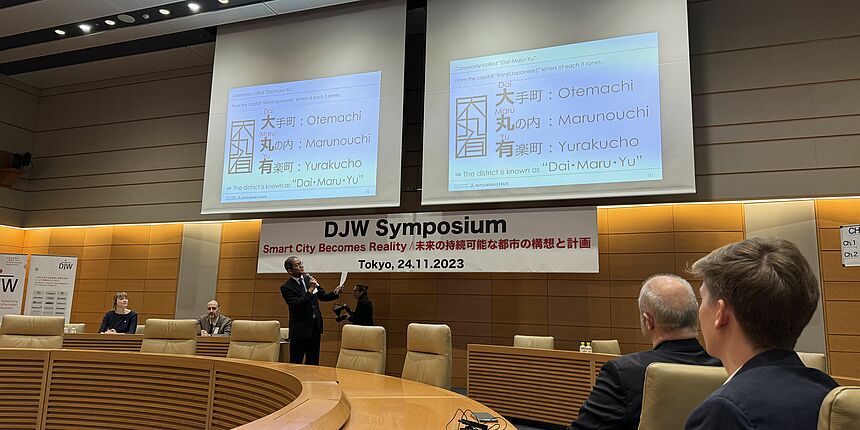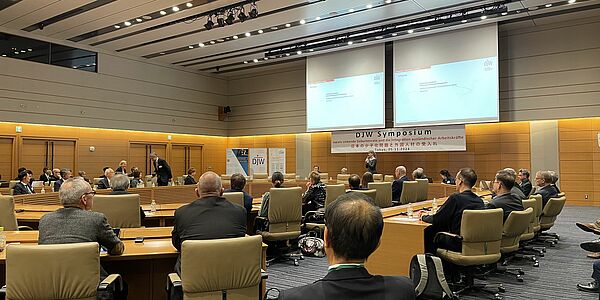DJW Symposium 2023: Smart Cities of the future

In the international conference room of the Japanese Parliament in Tokyo, the Japanese-German Business Association (DJW) once again held an exciting symposium, which Enobyte had the opportunity to attend. As at the symposium in Munich, this year's topic was the realisation of "Smart Cities" and general concepts of future coexistence. Of course, a central point was also the sustainability of such concepts and how a Smart City can contribute to a sustainable world through intelligent resource planning and usage.
After the opening by Chairman Gerhard Wiesheu and the welcoming remarks from Ms. Shikibu Oishi of the German Embassy in Tokyo, Mr. Yasutaka Goto from Mitsubishi Estate Co., Ltd. presented the development project Dai-Maru-Yu at Tokyo Station. This district, an amalgamation of Otemachi, Marunouchi and Yurakucho, is home to the headquarters of many international corporations, with tens of thousands of people working in close proximity. In recent years, Mitsubishi Estate and the Dai-Maru-Yu consortium have been developing the district into a model of a Japanese Smart City.
As a result, Dai-Maru-Yu has become the leading self-managed Smart City area in Japan. Apps allow residents and commuters to participate more effectively in communal life by informing them about events or enabling the planning of a cool route on hot summer days with real-time shade data. Additionally, the Smart City can analyze the usage patterns of the apps to improve future planning. The concept is based on a continuous update and redesign cycle, aiming to continually enhance life and community.
Following this presentation, top-class panelists engaged in a diverse discussion. It became evident that all panelists were convinced that many challenges faced by societies in Germany and Japan today can be solved with existing technologies. "Creating new solutions with simple means" was the guiding principle. Global cooperation and knowledge exchange were emphasized as key drivers for joint improvements.
For Prof. Dr. Christian Dimmer from Waseda University in Tokyo, it was also important that every smart city supports the diversity of society, becomes a meeting place for a wide variety of people and involves all citizens in its further development. In particular, it is advisable to first identify actual problems and then work on specific solutions for them, rather than using technology for technology's sake.
Prof. Masahiro Horiuchi (Tama Art University) advocated for a local approach in which individuals share their resources and abilities to foster community cooperation at the local level. Through Warm- and Cold-Sharing, citizens could, for example, gather in home cafés to save energy, support each other in projects, or even share the solar energy they produce.
Prof. Dr. Jan-Dirk Schmöcker from Kyoto University discussed the future of transportation. While the car might not disappear anytime soon due to perceived autonomy, Micro-Mobility and Mobility-as-a-Service concepts play a central role in his vision of 15-minute-cities.
Mr. Goto was convinced that artificial intelligence (AI) will play a significant role in the future, particularly in the data analysis of various Smart City sensors and apps. He therefore advocated for stronger regulation of AI in order to establish clear guidelines for its deployment.
Particularly with regard to the failed Smart City project in Toronto, the discussion concluded that the buy-in of citizens and "users" of the Smart City should take precedence over the speed of development projects. Privacy concerns of the population must be taken seriously and considered in order to create and maintain a livable and popular Smart City.
Mr. Tetsuo Narukawa, Deputy Chairman of DJW, summarised the results before the event concluded with good sushi and engaging conversations.
We look forward to hearing inspiring presentations and discussions at the DJW Symposium again next year.

